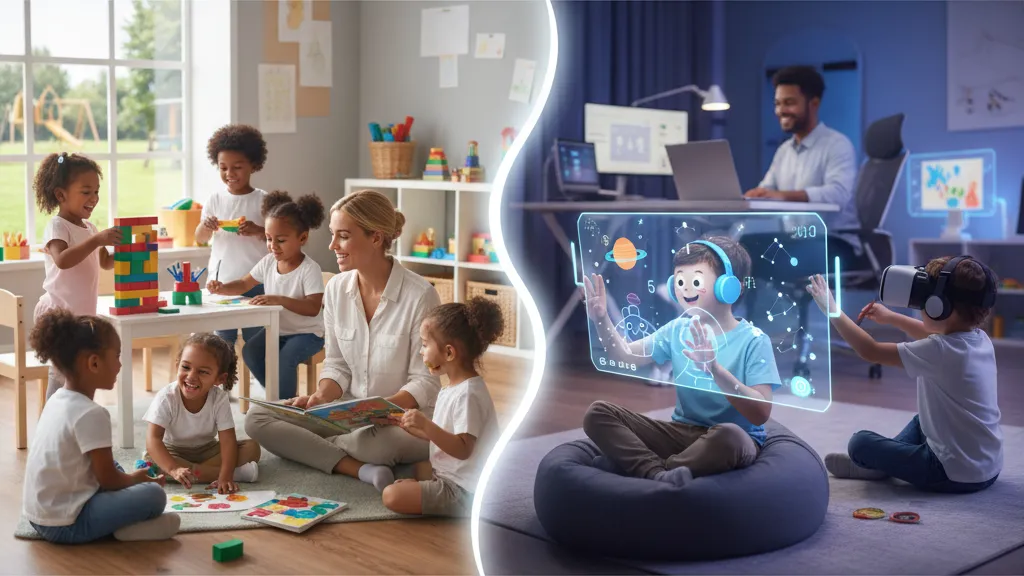Daycare vs Online Kid Classes: Which Option is Better in 2025?
In 2025, parents face an important decision when it comes to their children’s early learning and development: choosing between daycare centers and online kid classes. Both options provide unique benefits, and the right choice often depends on a family’s lifestyle, budget, and priorities. With rapid advancements in technology and changing work patterns, this debate has become even more relevant. In this article, we’ll explore the key differences, advantages, and drawbacks of each, helping you determine the best path for your child’s growth and education.

The Growing Importance of Early Education in 2025
Early childhood education is more than just babysitting; it shapes social, emotional, and cognitive development. Parents are increasingly aware that what happens before kindergarten can influence a child’s future success. Daycare programs and online kid classes both claim to prepare children for school, but they do so in different ways.
In today’s digital-first era, parents are balancing the need for real-world socialization with the convenience and flexibility of technology. This shift explains why the debate between daycare vs online classes is stronger than ever.
Understanding Daycare: What It Offers Children
Daycare provides a structured environment where children spend hours engaging in group activities, supervised play, and early learning exercises. Most daycare centers follow schedules designed to mimic school routines. This helps children transition smoothly into kindergarten later.
Daycares also focus on socialization. By interacting with peers daily, kids learn sharing, teamwork, conflict resolution, and emotional regulation - skills that are hard to replicate in an online setting.
Key Benefits of Daycare:
- Social interaction with peers
- Hands-on learning through play-based activities
- Professional supervision and safety standards
- Preparation for structured school environments
The Rise of Online Kid Classes in 2025
Online kid classes have surged in popularity since the pandemic and continue to evolve with interactive tools, gamified learning, and virtual group sessions. In 2025, platforms now offer tailored courses in reading, math, art, and even coding for preschoolers.
Parents appreciate the flexibility of online classes. They can select class times that fit their schedule, and children can learn from the safety of home. Plus, kids are exposed early to technology, a critical skill for the future.
Advantages of Online Classes:
- Flexibility in timing and curriculum choices
- Wide variety of subjects, from language to STEM
- Personalized learning through adaptive software
- Convenience for parents working from home
Cost Comparison: Daycare vs Online Classes
One of the biggest concerns for parents is cost. Daycare can be expensive, especially in urban areas, where fees cover staffing, meals, and facilities. Depending on the region, daycare costs may range from hundreds to thousands of dollars monthly.
Online classes, on the other hand, are generally more affordable. Parents pay for course subscriptions or per-class fees, which can cost significantly less than full-time daycare. However, families must also consider hidden costs like the need for a stable internet connection, devices, and parental supervision during sessions.
Summary of Cost Factors:
- Daycare: Higher fixed costs, but includes meals and physical care
- Online Classes: Lower costs, but may require parental involvement and tech investment
Social Development: Where Does Each Option Stand?
Daycare excels at promoting social and emotional development. Children learn cooperation, empathy, and problem-solving by being around other kids. These real-world interactions prepare them for the collaborative nature of school and life.
In contrast, online kid classes may limit opportunities for natural socialization. While some platforms now offer group sessions with interactive features, these cannot fully replicate face-to-face interactions. Children may become adept at digital communication but miss out on body language and physical play.
Academic Readiness: Which Prepares Children Better?
When it comes to academics, online classes can offer more structured and targeted lessons. Children can engage with interactive apps that adjust difficulty based on performance, ensuring personalized growth. For example, math apps can adapt to a child’s skill level, keeping them engaged without being overwhelmed.
Daycare, however, often focuses on holistic learning through play. While children may not get as much direct instruction in reading or math, they build foundational skills like listening, focus, and group learning. These are equally critical for long-term academic success.
Flexibility for Parents in 2025
Modern families need solutions that match their lifestyles. Parents who work long hours or commute often prefer daycare, as it provides full-day coverage. It ensures children are cared for while parents focus on work.
On the other hand, parents working from home or with flexible schedules may prefer online kid classes. This allows them to stay close to their children while ensuring they receive educational input. However, it also requires a parent to be available to supervise, which may not suit every household.
Technology’s Role in Online Learning
By 2025, technology has transformed online kid classes into highly engaging experiences. Virtual reality, AI tutors, and gamification have made lessons interactive and fun. Children can learn languages by virtually traveling to other countries or practice math with AI-based feedback.
While this is exciting, it also introduces challenges like screen time management. Parents must balance the benefits of educational technology with the risks of overexposure to screens, which can affect health and behavior.
Health and Safety Considerations
Parents also weigh health and safety when choosing between daycare and online classes. Daycare centers follow safety regulations but still expose kids to illnesses due to close contact with others. For working parents, this is a constant concern.
Online kid classes reduce exposure to germs since children remain at home. However, sedentary screen time may lead to issues like eye strain or reduced physical activity. Parents must therefore ensure regular breaks, exercise, and offline play.
Making the Best Choice for Your Child in 2025
Ultimately, the choice between daycare and online kid classes depends on a family’s unique needs. Parents should consider:
- Budget and affordability
- Work schedules and availability for supervision
- Child’s personality - does the child thrive in groups or prefer focused one-on-one learning?
- Future goals for education and development
For some families, a hybrid approach may be the best - enrolling kids in daycare part-time while supplementing with online learning at home. This way, children benefit from both socialization and targeted academic instruction.
Conclusion
In 2025, the debate of daycare vs online kid classes reflects broader changes in family dynamics, technology, and education. Daycare continues to provide strong social and emotional foundations, while online classes offer flexibility and personalized academic growth. Neither is universally better; the right choice depends on what each family values most. By carefully weighing the pros and cons, parents can make an informed decision that supports their child’s development and future success.











